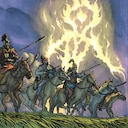Instalar Steam
iniciar sesión
|
idioma
简体中文 (Chino simplificado)
繁體中文 (Chino tradicional)
日本語 (Japonés)
한국어 (Coreano)
ไทย (Tailandés)
български (Búlgaro)
Čeština (Checo)
Dansk (Danés)
Deutsch (Alemán)
English (Inglés)
Español - España
Ελληνικά (Griego)
Français (Francés)
Italiano
Bahasa Indonesia (indonesio)
Magyar (Húngaro)
Nederlands (Holandés)
Norsk (Noruego)
Polski (Polaco)
Português (Portugués de Portugal)
Português - Brasil (Portugués - Brasil)
Română (Rumano)
Русский (Ruso)
Suomi (Finés)
Svenska (Sueco)
Türkçe (Turco)
Tiếng Việt (Vietnamita)
Українська (Ucraniano)
Informar de un error de traducción



































My recommendations is to get the Dostal Sureshot as your first blessing after Pela and either Yryarda's Milk or Busenari's milk blessing. Extra food AND super effective skirmishing is super dope.
If your clan gets a young Dostalite at clan creation you are in for a treat. The Dostal ritual is way easier to succesfully complete than the Elmal one, and you can get your Dostalite to heroic combat and food easily from it by selecting to improve the ritualists skills after a succesful ritual. One guy handling your food and combat is just insane.
I feel like I have to constantly pour everything into defence and warriors, but I'm still outrageously outnumbered and punished each time. On top of that, almost every other event is debilitating on its own.
The longer your line is, the closer you are to getting the other side to lose. If both of the lines are the same length, neither side is closer, so neither has a relative advantage, and the symbols would be in the center since the battle can go either way.